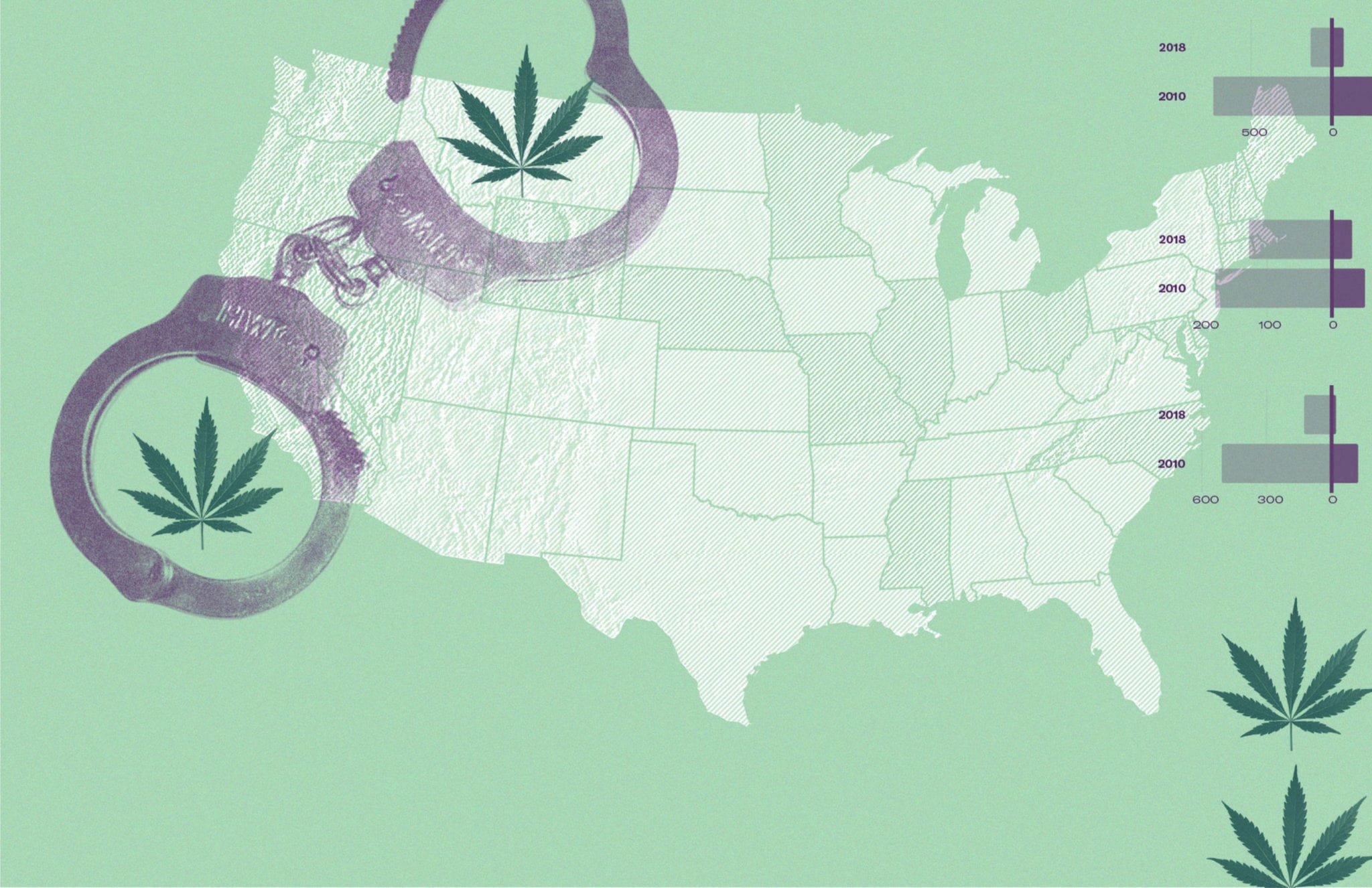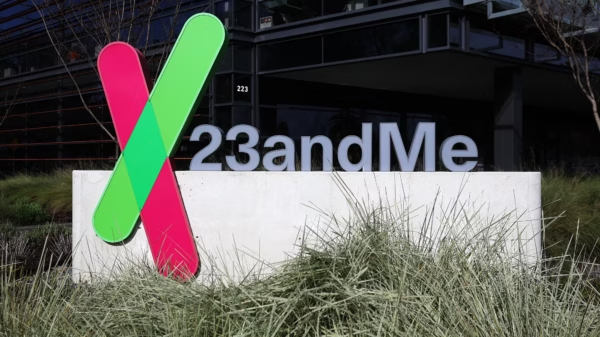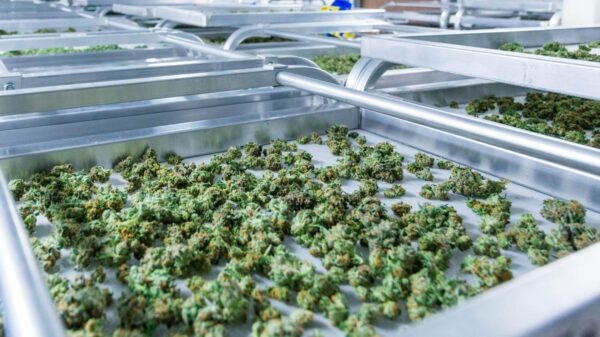Despite being legal now in 33 U.S. states, millions of Americans are getting arrested for cannabis possession — and a disproportionate number of them are black.
That’s the summary of a new report — Tale of Two Countries: Racially Targeted Arrests in the Era of Marijuana Reform — released by the American Civil Liberties Union (ACLU) on 4/20, cannabis culture’s most important day of the year.
The 20th of April is usually marked by celebrations where stoners toke up, jam out and gorge on munchies.
But as COVID-19 halts physical gatherings this year, the ACLU wanted to use weed’s big day to highlight a serious disparity: Black people are 3.64 times more likely than white people to be arrested for cannabis possession, although usage rates are similar.
The non-profit organization broke ground in 2013 with the first-ever national report to look at cannabis-related arrests across the U.S. from 2001 to 2010. The first report, The War on Marijuana in Black and White, was based on data collected a couple years before Colorado and Washington became the first states to legalize recreational weed.
In 2010, there was one cannabis arrest every 37 seconds in America, and states spent over US$3.6 billion enforcing possession laws.
The updated report looked at the same FBI and state population data, but this time from 2010 to 2018 as legalization began spreading throughout the country.
While overall arrests are down in states that have ended prohibition, the racial disparities in arrest rates remain in every state. In fact, some still-criminalized states have been arresting black people almost 10 times the rates of white people.
“Disturbingly, too much has remained unchanged in the past decade despite several states having reformed marijuana policy,” the report reads. “Just as before, such racial disparities in marijuana possession arrests exist across the country, in every state, in counties large and small, urban and rural, wealthy and poor, and with large and small Black populations.”

Image via Tale of Two Countries: Racially Targeted Arrests in the Era of Marijuana Reform published by the American Civil Liberties Union on April 20, 2020.
The more things change…
In states with legal weed, the ACLU found that the rate of disparity was on average 1.7 times, while in prohibition states it was 3.2 times.
But in a handful of legalized states, the reports says disparities have worsened. For example, in Maine and Massachusetts — both of which legalized cannabis for adult use via the ballot box — the racial disparities in marijuana possession arrests were wider in 2018 than in 2010.
While the ACLU reported cannabis arrests are down 18 per cent since 2010, to 6.1 million, it also said that nine out of 10 arrests were for non-violent possession.
The report notes a simple possession charge in most states can cost a person their job, future employment, housing, travel options and child custody — and those major life setbacks also disproportionately affect people of colour.
As far as a decline in cannabis arrests falling in line with legalization, the report showed a reverse correlation. It noted how in 2018 there were nearly 100,000 more arrests than in 2015.
Release cannabis prisoners amid COVID-19 outbreak, ACLU says
In its 4/20 statement, the ACLU said the timing of the new report punctuates how the U.S. prison system is currently overwhelmed by the public health crisis presented by COVID-19.
The ACLU calls on all three levels of government in America, along with law enforcement and the courts, to take steps to release people from prison with possession charges.
Read more: Release non-violent and weed-related inmates to slow COVID-19, says amnesty advocate
“Criminalizing people who use marijuana needlessly entangles hundreds of thousands of people in the criminal legal system every year at a tremendous individual and societal cost,” said Ezekiel Edwards, director of ACLU’s Criminal Law Reform Project. “As a matter of racial justice and sound public health policy, every state in the country must legalize marijuana with racial equity at the foundation of such reform.”
It’s past time that we not just legalize marijuana, but do so in a way that tackles racial disparities head-on.
The MORE Act will do just that.
This #420day, tell your representatives to pass the most comprehensive marijuana reform bill in Congress. https://t.co/SD9sOaMExT
— ACLU (@ACLU) April 20, 2020
ACLU finds unlikely ally in MORE Act campaign
One of key recommendations made in the report is for U.S. Congress to pass the the Marijuana Opportunity Reinvestment and Expungement (MORE) Act, which aims to correct historical social injustices of the war on drugs by decriminalizing weed at the federal level. The bill would also reassess all past cannabis convictions, remove pot from the list of federally banned substances, and focus on allowing economically disadvantaged communities to benefit from the new legal market.
The ACLU found an unlikely partner in Ben & Jerry’s Ice Cream for its campaign drive to support the MORE Act and cannabis-related racial justice.
“Legalizing cannabis without justice is half baked,” the stoner-friendly ice cream maker said on 4/20.
The Vermont-based company highlighted via blog posts and social media how white people are primarily the ones to benefit from the new lucrative legal regime.
While the global cannabis industry is on pace to grow to almost US$74 billion by 2027, only 4.3 per cent of business owners are black, versus 81 per cent who are white, Ben & Jerry said.
This #420, we're joining the @ACLU to talk justice. Specifically, justice for the people of color that cannabis legalization has left behind. Get the full scoop and take action now: https://t.co/FolxgtEUgY pic.twitter.com/apz0swYIsr
— Ben & Jerry's (@benandjerrys) April 19, 2020
Read more: Industry experts say more executive diversity will improve weed’s bottom line
Top image courtesy of the American Civil Liberties Union
jared@mugglehead.com
@JaredGnam














